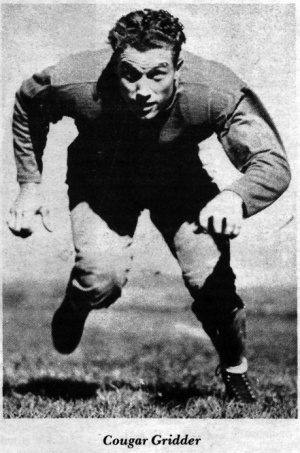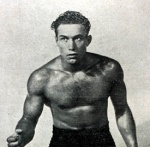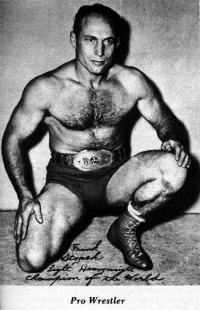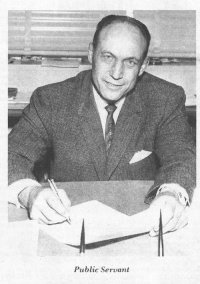Personal tools
Help
Tools
Class Notes
- Do you have news for fellow WSU alumni and other readers of Washington State Magazine? Send us your class note.
Our Story
written by alumni, faculty and friends.
NOTE: THIS IS A LEGACY SITE AND IS NOT REGULARLY MAINTAINED
Views
Stojack Succeeds in Many Endeavors
From Our Story
Alumni Profile – Frank Stojack
Published in WSU HillTopics, January 1972
Unlike the "jack of all trades who was master of none," Frank Stojack seems to epitomize "success" no matter what his field of endeavor – whether it be athletics where he first made his name, working with youth, or as a public servant. WSU alums most closely identify with Stojack as the rock-solid, curly-haired kid who came out of Lincoln High School in Tacoma to star for the Cougars in football and wrestling in the early 1930s. He was one of Coach Babe Hollingbery's "watch-charm guards," better known as half of WSU's famous "Gold Dust Twins" with the late Henry Hayduk. The two anchored WSU's line from 1932-34 when the Cougars combined for a 16-7-3 mark and registered wins over USC, UCLA and California while never losing to Washington.Stojack's sports career began at an early age. He won 13 varsity letters at Lincoln in five sports — football, track, wrestling, decathlon and soccer. Along with his athletic achievements, he was named recipient of the Richard Graff trophy, an award based on combined scholastic and athletic ability.
Entering WSU in 1931, Stojack had won all-Coast honors and mention on several All-America teams by his senior year. He also was chosen to play for the West team in the annual Shrine football game in San Francisco. Even today he is considered by many to be "one of the greatest defensive guards ever to wear the Cougar colors."
How the seventh of eight children born to immigrant parents made it to WSU — or any college for that matter — in those post depression days when "money" was just a word in the dictionary, is a tribute to Stojack and others like him. Among his prized souvenirs, Stojack possesses a yellowed and aged telegram from Hollingbery which reads: "Better start hitch-hiking. No money available for transportation."
Paralleling Stojack's success in football was his ability as a wrestler which later overshadowed his grid accomplishments. During his varsity career at WSU, Frank won the Pacific Coast Conference junior heavyweight title and never lost a match as a Cougar competitor. To help finance his education, Stojack served as head wrestling coach during his senior year.
Frank was known as a good tactician in and out of the ring. If the Cougars' mat opponent had a good heavyweight, Stojack would wrestle in that class. If the best foe was a light heavyweight, the Cougar coach would drop down into that division. He wasn't particular in his desire to win as many points as possible for the Cougar team and leave the easier marks for his teammates.But all of his wrestling opponents were not from other schools. The story is told of a difference of Opinion between Stojack and the late Arthur "Buck" Bailey, then line coach of the Cougar football team under Hollingbery. Babe suggested that the matter be settled in the ring. Both agreed.
The match was held after Stojack had played 60 minutes in an intercollegiate football game earlier that same afternoon. There wasn't an empty seat in Bohler Gym. If Stojack's memory serves him correctly, he gave away nearly 80 pounds to the 260-pound Bailey, but won the match with an "airplane spin" he later made famous in a pro wrestling career that culminated with Stojack being crowned Light Heavyweight Champion of the World.
After earning his diploma and a degree in Physical Education at WSU in 1935, Frank joined the old Brooklyn Dodgers of the National Football League. One of 54 candidates in the Dodger camp, Stojack went on to win a starting position at right guard and played two seasons despite being one of the smallest linemen in the league. Authorities say Stojack could have played longer, but Frank elected to devote 12 months a year to professional wrestling so he and the Dodgers parted company.
As a professional wrestler, when wrestling was in its heyday, Stojack depended to a great extent on the inherent strength in his legs.
As pro wrestlers go, Stojack was not big, but a tough, rugged wiry man weighing in the 180s and depending to a great extent on the inherent strength of his legs. Flying tackles, drop kicks, leg scissors, together with giant swings and figure four spinning scissors, were the tactics he called on most. But it was his famous airplane spin — where he would hoist an opponent over his head and sometimes give the helpless grappler 10, 20 or 30 revolutions before finishing up in a body slam to the mat – that won him the nickname "The Tacoma Twirler and later the world title in a match with Gypsy Joe.After 18 years and 4,000 professional matches, Stojack was honored with the Youth Inspiration Award — a tribute by the Wrestling Alliance of America. The certificate read: "to the man who had done most to keep pro wrestling clean and scientific. In a sport noted for its tough characters in its heyday, Stojack was renowned as the exponent of fair play and a 'give the other guy a break' philosophy."
Frank continued his ring career well into the 1950s, past his 40th birthday, and managed to combine these activities with a busy civic career, including city councilman, in Tacoma which led to the post of sheriff of Pierce County. Always a great friend of kids and easy prey for young autograph hunters, Stojack coached Pee Wee football in Tacoma for a number of years. This was during the time money was needed to finish the Tacoma Boys Club which had started five years earlier. With Frank spearheading the drive, a 1953 charity game pitting Stojack and 27 wrestling buddies against the semipro Seattle Ramblers, took place in what was billed the "Muscle Bowl." Most of the wrestlers were 40 years or older at the time, but as Frank recalls "they came for nothing." The powerful Ramblers won 20-6 in a game that netted $5,400 for the Tacoma Boys Club. "We weren't trying to prove anything," said Stojack. "We just wanted to help the kids."
An account of the Muscle Bowl game revealed that the wrestlers had a hard time catching the younger Ramblers on end sweeps, but they didn't allow an inch through the line.
Later on in his successful pro wrestling career, Stojack gave numerous benefits throughout Pierce County to raise money for youth activities. Frank is reluctant to discuss this phase of his career, stating simply, "I did those things to help some good cause — not for publicity."Stojack's interest in his community revealed itself when Frank filed for Councilman in Tacoma. "I did not file for City Council because of ambition, financial gain, or because I thought I was better qualified than other sincere citizens," Frank said. "I felt that the time for the average citizen, the businessman, the white collar workers and the man who works with his hands, to band together on this council and work as a team.
Successful in his bid for City Councilman, Frank later went on to seek and win the race for sheriff of Pierce County — a position he held for four years. He later became a successful businessman as executive secretary and manager of the Tacoma Chapter of the Associate General Contractors of America, Inc. Now, by his own admission, Frank has "retired to look after my own interests."
Our Story site map
Our Story main page | Our Story categories | Help Desk
Contact | Give | Advertise
Washington State Magazine | Washington State University | Class Notes
Our Story is coordinated by
In partnership with
Our Story and Washington State Magazine are publications of Washington State University. All rights reserved.
P.O. Box 641227, Washington State University, Pullman, WA 99164-1227 USA | wsm@wsu.edu, 509-335-2388
Accessibility | Copyright | Policies




